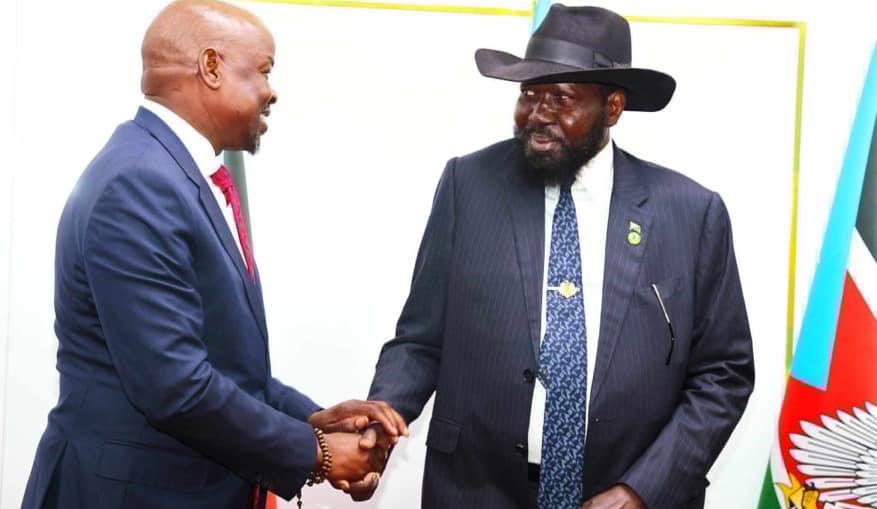In South Sudan’s turbulent political landscape, emotional and impulsive reactions often overshadow essential discussions about the future of governance and the peaceful transfer of power. Within this context, Gen Aleu Ayieny recently sparked controversy when he criticized new Second Vice President Bol Mel based on rumors that Mel was nursing presidential ambitions.
While addressing the public during the welcoming ceremony of the new Governor of Warrap State in Juba, Gen Ayieny made a comment that sparked public debate.
Referring to Bol Mel, he stated:
“Tell Bol Mel not to behave like an incoming president. Wani spent 12 years as Vice-President and Deputy Chairman of the SPLM but never thought of succeeding President Salva Kiir.”
Regardless of the individuals involved, the core issue that merits discussion is this: why has political ambition become a chargeable offense? Has contemplating leadership transition turned into an act of hostility that warrants public scolding?
This article is not a defense for any individual, but an attempt to rationally interpret the underlying messages in the Ayieny remarks.
Ayieny did not critique a political platform or present an alternative vision. Instead, he relied on broad assumptions and rumors to launch a direct attack on Bol Mel. The core of his criticism is that simply thinking or aspiring to leadership is unacceptable—a stance that raises a fundamental question: is political ambition inherently wrong, or is its rejection conditional on who expresses it?
In democratic systems, political ambition is seen as a legitimate right of every citizen and a key indicator of political vitality. When ambition becomes an implicit crime, we are faced with a closed political logic that rejects plurality and reduces the state to a single individual or a narrow elite—an unsustainable situation that inevitably leads to serious consequences.
Bol Mel may not be an ideal candidate, nor is he above criticism. However, his public denial of any intention to run—along with the absence of any direct statement suggesting otherwise—places him in an unfair position of being attacked without evidence.
For some observers, Bol Mel symbolizes a possible figure within a new generation of potential leaders, given his well-known legacy in the liberation struggle and his relative distance from entrenched ethnic polarization. Should the mere circulation of his name as a possible alternative justify political accountability?
Ayieny’s remarks are not limited to Bol Mel; they send a broader message: that thinking outside the boundaries of the current ruling power structure may be interpreted as betrayal or rebellion. This reflects a more serious political crisis—the closure of any peaceful path toward leadership transition.
Ironically, these remarks come at a time when efforts—at least on paper—were underway to prepare for elections. How can we genuinely call for a democratic environment while instilling fear in those who consider participating in shaping it?
If we view Bol Mel as a political-military figure, it makes sense to pose the following questions:
- Does he have a popular base? Possibly, but there are no clear indicators of a political movement under his leadership.
- Does he possess a mature political vision? This remains unclear and would require practical testing.
- Does he face real obstacles? Absolutely—the most pressing being the closed political structure, the rhetoric that vilifies ambition, and the weakness of political parties as platforms for genuine contestation.
Yet if every citizen has the right to be evaluated based on qualifications, then it is unjust to condemn someone based solely on rumors.
It is concerning that the primary standard for acceptance within the ruling circle appears to be silence and loyalty. Conversely, anyone who shows independence—or is merely perceived to be ambitious—is viewed as a threat.
What is needed is a renewed political discourse that respects the right to ambition and competition. As a military and political figure, Ayieny would have done better to offer a critique backed by facts rather than reproducing exclusionary rhetoric that contradicts the principles of pluralism.
The reality is that South Sudan cannot progress without opening the door for new leaders with different visions. Political ambition is not betrayal, nor is it a conspiracy. It is an essential part of any dynamic, resilient political system.
Bol Mel may not be the solution, and he may not even be interested in the presidency. But the mere act of considering him as one of the alternatives should not be met with suspicion or reprimand—it deserves discussion, critical review, and peaceful competition.
A state that suppresses ambition is a state slowly collapsing from within.
The writer, Mahmoud Akot, is a South Sudanese political activist based in France. He can be reached via email: mahmoudakot@gmail.com
The views expressed in ‘opinion’ articles published by Radio Tamazuj are solely those of the writer. The veracity of any claims made is the responsibility of the author, not Radio Tamazuj.




